In the News
Podcasts »
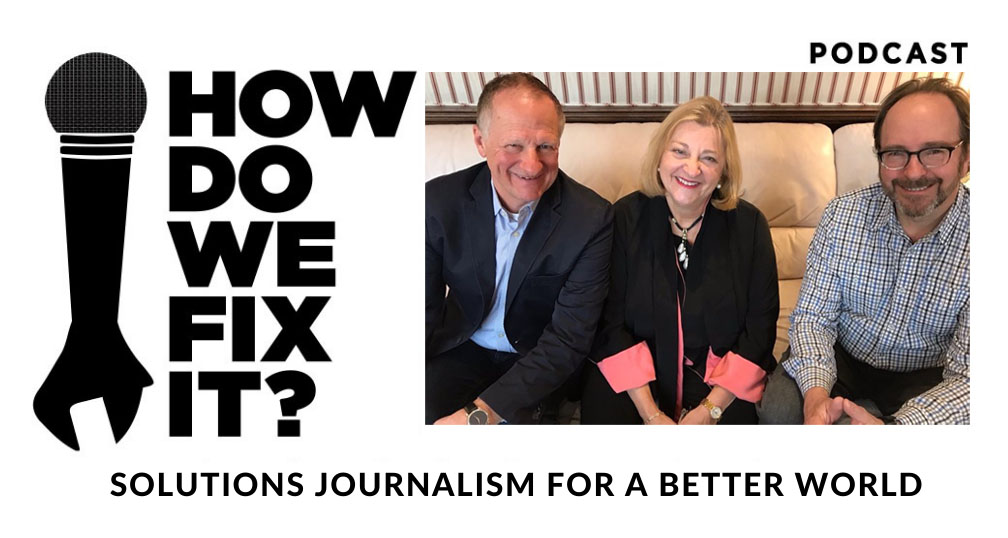
America’s Leadership Crisis: Davia Temin — How Do We Fix It? podcast with host Richard Davies
To listen, Click Here.
Companies: Crisis and Common Ground — Let's Find Common Ground podcast with hosts Richard Davies and Ashley Milne-Tyte.
To listen, Click Here.
Communicating with Authority and Compassion in Crisis or Opportunity — Voice America’s Out of the Comfort Zone with host Wanda Wallace.
To listen, Click Here.
Leading Through Crisis & Chaos — Know the Rules of the Game® Podcast with host Desiree Patno & Special Guest Davia Temin.
To listen, Click Here.
Temps at the Top — Marketplace with Kai Ryssdal.
To listen, Click Here.
You Can Eradicate Sexual Harassment in Your Organization — Monday Morning Radio.
To listen, Click Here.
Leading in a ‘Me Too’ Era
In the era of #MeToo, leaders need to know what to do to prevent the problem in the first place.
To listen, Click Here.
...more »
Temin and Company is often quoted in print, broadcast and social media on topical issues as well as industry trends.
Following is a list of links to those articles, beginning with the most recent.
What The Spotify, Glenn Youngkin And Eric Lander Statements Tell Us About The Art Of Apologizing Today
Jena McGregor, Forbes, February 8, 2022
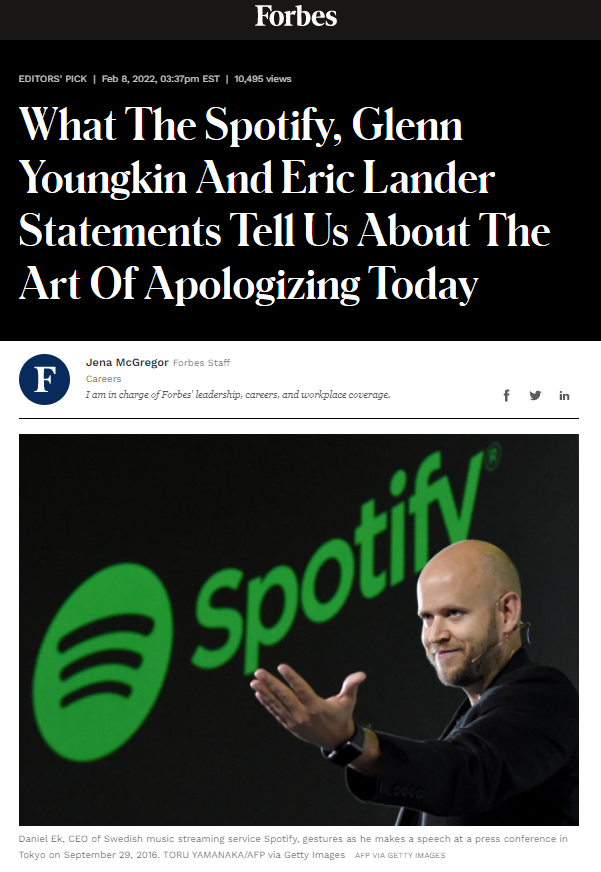
It’s been a big week for high-profile apologies.
Virginia Gov. Glenn Youngkin said he regretted what he called an “unauthorized” Twitter swipe from his team to a teen. Biden administration science adviser Eric Lander apologized for his treatment of subordinates. Joe Rogan said he was sorry for his use of the n-word in past podcasts just a week after an earlier apology about conversations on his show with vaccine skeptics. And Spotify CEO Daniel Ek apologized to staff for the impact on them of the racial slur controversy as the streaming service’s P.R. crisis continues.
But how effective apologies are often depends on how much responsibility the person takes—and increasingly important, who’s doing the listening. Communication pros say that while good apologies take unfettered ownership for what happened, the practicalities of a divided country mean it’s harder than ever to offer an apology that will appease everyone.
“In any discussion today it’s almost impossible to make everyone happy—and apologies are the same,” says Davia Temin, a communications adviser who is also a contributor to Forbes. “If you string a few of the right words together it can sound to people like it was an apology. … The art of the non-apology has been refined tremendously.” […read more]
Most People in Workplace Relationships Don’t Tell HR
Ella Ceron, Bloomberg, February 7, 2022

The pandemic has brought a flowering of the workplace romance — but most of the office lovebirds aren’t telling human resources about it.
About a third of U.S. workers say they’re currently in or have been a part of a workplace romance, up from 27% two years ago, according to a survey from the Society for Human Resource Management (SHRM). But 77% of respondents said their employer doesn’t require them to disclose such a relationship. And so, not surprisingly, an equal number (77%) of survey takers haven’t informed their employer about office romances they’ve been involved in. That can lead to problems.
“A lot of people would rather kiss a rattlesnake than go to HR and say, ‘I’ve entered into a consensual relationship with my coworker,’” said Davia Temin, the CEO of crisis consultancy firm Temin and Co. “It’s not the most comfortable thing to do. And you don’t know whether it’s going to last.” […read more]
Axel Springer plans to force disclosure of employee relationships after Bild scandal
Erika Solomon, Olaf Storbeck, Kaye Wiggins and Anna Nicolaou, Financial Times, November 8, 2021
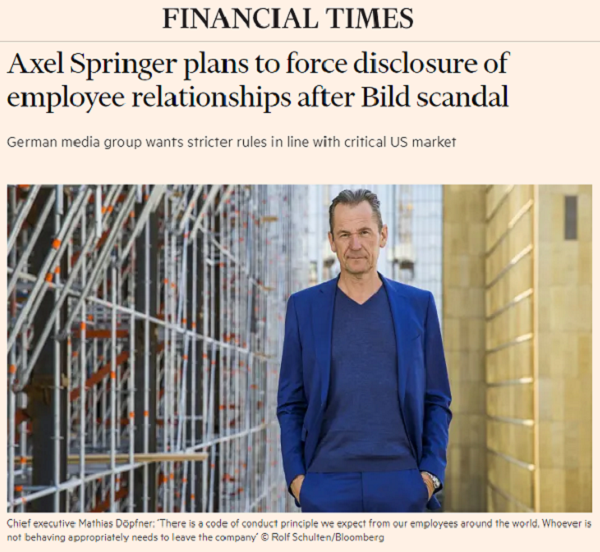
German publishing giant Axel Springer plans to require its nearly 16,000 employees to disclose sexual relationships between managers and subordinates, in the wake of a scandal that led to the ousting of the editor of its flagship newspaper Bild.
Chief executive Mathias Döpfner, facing questions over his handling of the incident, wants to impose such rules for the first time in the media group’s 75-year history.
But the plan has been met with scepticism from the company’s powerful worker representatives in Germany. It also stops short of prohibiting the company’s most powerful executives from pursuing relationships with junior staff.
***
In the US, the Me Too debate has fundamentally changed employers’ attitudes. There is increasingly a zero tolerance for relationships between senior bosses and subordinates, said Davia Temin, who runs a crisis-management company in New York.
“The world is changing,” she said. “What is acceptable is changing, abuse of power and the concept of that is changing.”
At a growing number of US companies, top executives now had clauses in their contracts saying there can be no relationship whatsoever with more junior colleagues, said Jennifer Kennedy Park, a partner at Cleary Gottlieb, who has written about “anti-fraternisation” policies.
“At the most senior level, the argument about consent becomes the hardest to judge because the person at the top of the organisation has power over everyone,” she added. […read more]
What Mark Zuckerberg Got Wrong In His 1300-Word Facebook Memo
Jena McGregor, Forbes, October 7, 2021
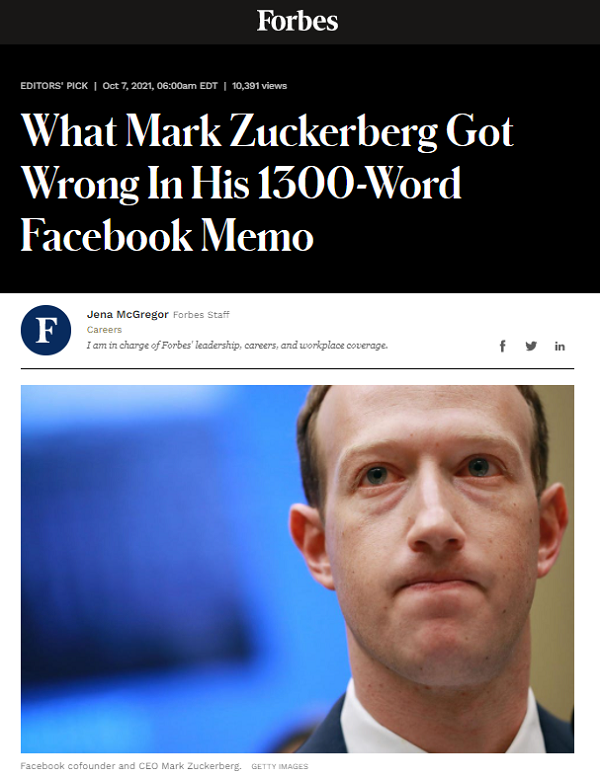
Facebook CEO Mark Zuckerberg finally weighed in on the escalating crisis at the social media giant on Tuesday with a lengthy missive that downplayed risks and hit the wrong note with people on and off the platform, doubling down on his defense of the company.
The memo followed stunning whistleblower testimony, a series of damaging media reports and one of the longest outages of the platform in its history on Monday, when a falling stock price prompted Zuckerberg to temporarily drop on the Forbes 400 list before rebounding.
Communications advisers criticized Zuckerberg’s more than 1,300-word memo to employees for being too long, defensive and out of tune with the emotionally charged debate playing out over the social media platform’s role in society. The memo launched with a technical term about the outage, lobbed a series of rhetorical questions and defended Instagram’s impact on teenage girls’ mental health.
***
For many people, Facebook has become so emotional – and its impact on society, democracy and mental health so personal – that a response that doesn’t take that tone is lacking, advisers said.
Especially during the pandemic, said Davia Temin, the founder of a reputation and management consulting firm, Facebook has become a tool to which many people are emotionally connected after so much time at home alone.
But in the response, “he’s missing that emotional quotient, and he’s missing it by a mile,” she said. (Temin is also a contributor to Forbes.)
“As a CEO you have to appreciate points of view that are not your own. You may be convinced with every cell of your body they may be wrong but nonetheless you have to take it into consideration and you have to respond to it.” […read more]
Texas based Match, Bumble react to new anti-abortion law
Isa Soares, CNN’s Quest Means Business, September 3, 2021
In an interview with CNN’s Isa Soares about business’s reaction to Texas’ new anti-Choice law, Davia Temin discusses how many companies are waiting to see the reaction of the public before taking a stand.
“Do not underestimate the power of employees….and of customers and of stake holders, shareholders, to affect the positions that corporations will take.”
“There’s a ‘Fanatical Group of Worshippers’ in Your Stock. What’s Next?”
Lindsay Frost, Agenda, June 28, 2021

AMC Entertainment Holdings CEO Adam Aron has been actively embracing on Twitter, YouTube and other platforms a new trove of investors who propelled the company’s stock price up more than 300% in the past month. The latest Reddit-driven phenomenon has companies reconsidering how to communicate with these investors and encourage them to stick around — especially for those companies that could use the investment to pay off debt and invest in innovations.
The so-called meme stock frenzy, which has led to a deluge of retail investors pouring into AMC, GameStop, Clover Health and the GEO Group, is a hotly debated topic on Wall Street, but for boards overseeing companies that suddenly have an influx of retail investors, sources say it’s important to nail down the right messaging, consider incentivizing these investors and use the cash wisely.
“This brave new world of all of these Internet platforms and every person having their own voice has the power to whipsaw pretty much everything we thought we knew, and that extends to the fundamental value of stock,” says Davia Temin, president and CEO of risk consulting firm Temin & Co. “The wise board, and certainly the wise company, has to understand what is going on and figure out the way to communicate to all parties in a way that engenders trust.” […read more]
Red Corporation, Blue Corporation? Corporate political speech becomes a board issue
April Hall, Directors & Boards, 2021 Second Quarter

After the January 6 attack on the U.S. Capitol, many companies announced that they would halt political contributions, either permanently or for a defined period. Some discontinuations involved a particular political party, some individual legislators and some were complete stops on all contributions.
In the age of “cancel culture,” when social media can circulate calls for boycotts to millions of people in minutes, some companies have begun to act quickly, with either their words or their wallets, to distance themselves from political controversy But there are other companies that have leaned in to a variety of public political positions. This raises the question: Are some companies becoming recognized as “blue” (Democrat-supporting) or “red” (Republican-supporting), or even “purple”? And are such associations good for a company, its shareholders and its stakeholders?
***
Crisis communications consultant Davia Temin says she often encourages her client companies to take apolitical stands.
During political or social upheaval, sometimes “corporations have to become the adults in the room,” Temin says. Corporations need to maintain some neutrality, “but it’s the difference between making sure that as a corporation you have a purpose and if you’re true to purpose.”
However, she doesn’t usually advise being outwardly political. She says there is a difference between having a “political point of view” and speaking out about a “behavior,” like systemic racism.
“I still think strict political lines are not the way to go,” Temin says.
She also doesn’t support the legal idea behind the Supreme Court’s landmark 2010 decision in Citizens United v. FEC, which said the free speech clause of the First Amendment prohibits the government from restricting corporations’ independent expenditures for political communications. The decision has been popularly associated with the notion of “corporate personhood.”
“Corporations are not people,” Temin says. “They are conglomerations of people, and they need big tents for their clients, employees and other stakeholders.
“That is different than having a sole political point of view.” […read more]
In Trump Era’s End, an Uneasy Reckoning for Corporate America
Jeff Green, Bloomberg, January 7, 2021
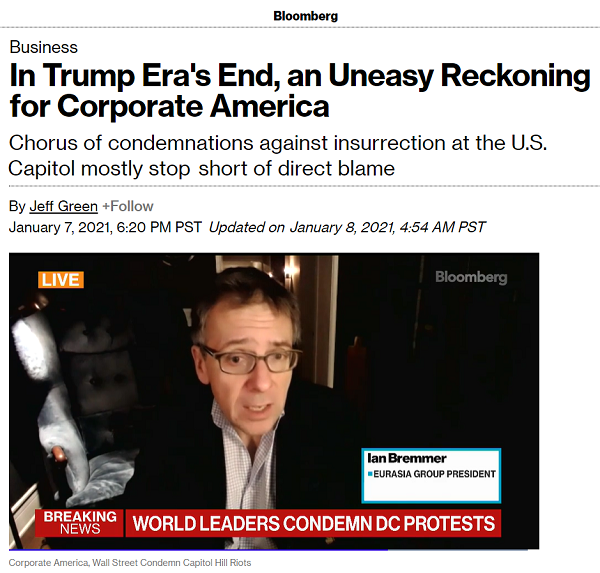
Corporate America is parting with its CEO president — carefully.
Four years after Donald Trump swept into the White House, cowing executives and shaking markets with tweet storms and tantrums, corporations that applauded when he cut taxes and red tape are struggling to come to grips with the havoc that’s now followed.
After Trump incited a mob of loyalists to storm the Capitol Wednesday, prominent business figures swiftly condemned the violence — without mentioning the president by name. Only one major business group, the National Association of Manufacturers, singled him out. Even as the Trump administration comes to its chaotic end, with calls for the president to be immediately removed from office, the business world is stepping delicately.
When Trump arrived in Washington, he could sway a company with a tweet. Now Facebook has suspended his account, possibly for the duration of his presidency, while Twitter put him on a 12-hour ban and warned it could take more permanent steps. Shopify, the Canadian company behind many e-commerce sites, said Thursday that it had closed two online stores that sell red MAGA hats and other Trump paraphernalia.
“That’s how quickly the worm turns,” said Davia Temin, founder of New York City crisis consultancy Temin and Co. “One needs to make a distinction between Trump the president, who you may or may not have made any comments about over the last four years, and the sedition, the attack on the Capitol that happened yesterday afternoon.” […read more]
Felicity Huffman lands 1st acting role since college admissions scandal
Good Morning America, December 1, 2020
The actress, who served 11 days in jail after pleading guilty in the Varsity Blues scandal, will star in an ABC comedy as the unlikely owner of a minor league baseball team.
“She’s been truly contrite and regretful, remorseful, about what she did,” said Davia Temin. “She comes out, maybe, with a renewed sense of purpose. That’s something that really works for reputation rehabilitation. Because it’s real.”
Know the Rules of the Game: Leading Through Crisis & Chaos
Desirée Patno, Know the Rules of the Game, June 17, 2020
We’re no longer in crisis, we’re in chaos. Here are rules to help you lead – yourselves, your family, company, and community – through crisis and chaos, with honor, integrity, and your reputation intact. From one of the most sought-after crisis strategists in the world.
Desirée Patno, host, Know the Rules of the Game Podcast, is joined by Davia Temin to discuss leading through crisis and chaos.
Podcasts »
Leading Through Crisis & Chaos
Know the Rules of the Game® Podcast: with host Desiree Patno & Special Guest Davia Temin.
To listen, Click Here.
Temps at the Top — Marketplace with Kai Ryssdal
To listen, Click Here.
You Can Eradicate Sexual Harassment in Your Organization — Monday Morning Radio
To listen, Click Here.
...more »



